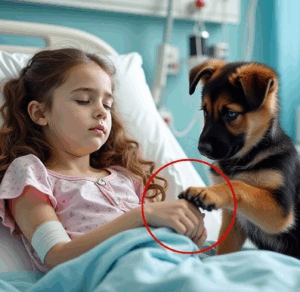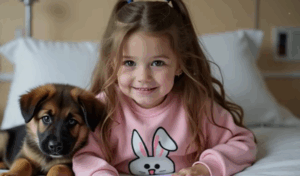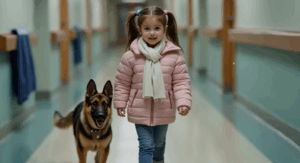Little Girl Had Only Days Left to Live… But What Her German Shepherd Did Made Even the Doctors Cry
The hospital sat quiet at the edge of Oregon’s national forest, nestled between snow-heavy trees and winding roads that barely made it onto maps. Its gray stone walls blended almost seamlessly into the winter landscape, a place where time seemed to slow and the outside world felt distant
Inside, room 214 waited like it always had—dimly lit, rarely used, and spoken of only in hushed tones among the overnight staff. No one could explain why, but patients placed in that room seldom recovered. It was cold in a way that lingered, even when the heat was turned high. Some called it the Still Room. Others simply avoided it.
00:00
00:00
00:30Mute
That winter, Aara Quinn, seven years old and silent as snowfall, was wheeled into 214. Her skin was pale, nearly translucent, and her breath barely stirred the plastic tubing beside her. For days, she hadn’t spoken, hadn’t blinked at light or sound. Her mother, Mara, a former elementary school teacher who had given up everything to sit beside her, stopped asking questions and started counting breaths instead. It was all that felt real anymore.
Outside the window, snow drifted in slow spirals. Machines hummed low and steady. The air held the weight of waiting.

No one expected what would happen next.
Not when a black-and-white shape appeared at the end of the hallway—quiet, low to the ground, moving with unsettling purpose. Security cameras never saw where it came from. One moment, the hall was empty; the next, it was there. Perhaps drawn by a force beyond understanding—as if summoned by Aara’s silent plea.
A stray German Shepherd, soaked with snowmelt and eyes gleaming with something too aware, paused outside room 214. Then, as if summoned, he stepped inside.
The hallway outside room 214 had long been the quietest stretch in the hospital. Even the most seasoned nurses avoided lingering there. So when the black-and-white shape emerged from the corridor, soaked with snow and silent, steady, no one stopped him.
Cameron, the night nurse, was the first to see him. The dog walked calmly as if he belonged. When he passed her, she felt a strange warmth in her chest, as if someone had just whispered, “Let him through.”
She did.
Inside the room, Aara lay still, machines pulsing quietly around her, glowing pale green and blue. Mara sat half-asleep in the recliner, her body draped in a hospital blanket.
The door creaked.
Mara looked up and froze.
For a moment, she couldn’t move.
A stray dog stood in her daughter’s hospital room.
That should have terrified her.
But it didn’t.
Twelve years ago, Mara had raised a German Shepherd named Toby. From puppyhood, he had been her best friend, her shadow, her comfort through grief, through single motherhood, through everything. He had passed away just two winters ago.
The dog before her looked almost identical—same fur, same eyes, the same stillness.
When he looked at her, something shifted in Mara’s chest. Her breath caught. She didn’t speak or move, but in her heart something opened.
She nodded just once, as if that was all the dog had been waiting for.
He stepped forward—quietly, confidently.
He climbed onto the mattress with practiced care and lay down beside Aara.
Then slowly, he placed one paw on top of her tiny open hand.
Nothing happened.
And then it did.
Aara’s fingers curled ever so slightly. Her voice cracked the silence.

“You really came.”
Initially, no one planned to let the dog stay. Hospital protocols were clear—no animals on patient mattresses, especially in critical care. But as Orion settled beside Aara, a sense of calm filled the room, challenging the rigidity of rules.
Room 214 had stopped following protocol a long time ago.
Aara had been moved to palliative care just thirty-six hours earlier. Her organs were slowing. Her brain showed almost no response.
Dr. Hail had delivered the update himself—voice low and clinical.
Mara hadn’t argued. She hadn’t even cried. Just nodded numb.
So when the dog appeared—this quiet, solemn creature with eyes that seemed to understand more than any human in the room—no one had the energy left to protest.
It was a nurse named Sienna who said it first, whispered, “Really, if he’s what’s keeping her here, just let him stay.”
No one disagreed.
So Orion stayed.
At first, he simply lay beside her—unmoving, unblinking.
Then came the twitch of her fingers, the whispered words.
Within hours, her heart rhythm began to stabilize.
By morning, her oxygen levels had risen. Her pupils were reactive.
“The neurologist team, once mechanical and dispassionate, now gathered at the doorway—hushed and unsure.”
“She’s responding to something,” Dr. Hail murmured, staring at the monitor. “I just don’t know what.”
By the second night, he didn’t hesitate when security raised concerns about the dog still being in the room. He signed the clearance himself.
“She’s dying,” he said. “If this dog is helping, he stays. No questions.”
No one asked again.
And somehow, the longer Orion remained, the more present Aara became.
She began tracking voices with her eyes.
She squeezed Mara’s fingers.
She responded to light.
It was subtle, slow—but it was there.
She was coming back.
On the morning of the third day, she sat up with help. Her voice, still faint, was clear when she looked at Mara and asked, “Can I have some applesauce?”
Mara dropped the spoon in shock.
Nurses cried openly in the hallway.
No one dared call it a miracle—not yet—but for the first time in weeks, they started calling her by name again.
Aara—not the child in 214.
Staff paused outside the room, some pressing their palms to the glass—not to check vitals, just to witness.
Because something real was happening.
Not a cure.
Not a theory.
But a reason to hope.
And in room 214, that had become enough.
By the end of the week, she was no longer the child everyone had quietly expected to lose.
She sat upright for hours now, sometimes sketching with crayons one of the nurses had brought. Other times, just staring out the window, Orion’s head resting comfortably in her lap.
But something else had begun to shift.
At first, it was barely noticeable.
Only the night staff mentioned it.
The temperature in room 214 always dropped after midnight, no matter how high the thermostat was set.
One nurse claimed she saw the room lights dim without anyone touching the switch.
Another swore she heard the faint sound of whispering when she passed the door.
Orion noticed it too.
He stopped sleeping through the night.
Instead, he sat upright for hours, posture alert, gaze fixed on the far left corner of the room—the one cloaked in shadows cast by the heart monitor.
Mara saw it first.
She woke one night to find Orion still and rigid, his eyes locked onto that dark corner.
When she whispered his name, he didn’t respond.
His ears twitched.
Muscles tight.
He was listening—or maybe waiting.
The next day, a new nurse, Ava, came in for routine vitals.
Young and unfamiliar with the odd energy of room 214, she entered with practiced cheer.
“Good morning, Aara,” she smiled.
Valera spoke before she could continue.
“Hey, she doesn’t sleep like we do.”
The room fell silent.

Ava blinked, thrown off by the girl’s tone—calm, steady, far older than her years.
Mara looked up sharply from her chair, startled.
Aara’s fingers moved slowly through Orion’s fur, her face unreadable.
Later that afternoon, Dr. Hail returned with a new set of brain scans.
Progress continued.
Cortical activity was increasing in areas once considered unreachable.
But he had begun documenting something else too—Orion’s behavior.
In his private notes, he scribbled things no medical journal would ever print:
“Dog alert at 3:12 a.m.”
“Imm patient stared into corner.”
“Temperature drop again.”
He didn’t know what to make of it, but he felt it too.
There was something in the room—or maybe something watching it.
It happened on the seventh night.
The snow outside had thickened into a silent, suffocating curtain.
Inside room 214, the air was still—heavy, not with fear, but with something waiting.
Aara was asleep, her small hand resting lightly on Orion’s back.
Mara dozed in the recliner, wrapped in her wool cardigan.
The room was dim, except for the green pulse of the heart monitor.
At 3:14 a.m., Orion rose.
He didn’t bark.
He didn’t growl.
He simply stood—muscles tense, ears forward.
His gaze returned to the same corner.
And this time, he moved.
One slow step.
Then another.
He positioned himself between Aara and the shadowed corner.
Tail stiff.
Head low.
Mara stirred awake, sensing the shift.
She sat up quickly, heart thudding.
“Ara,” she whispered.
The girl didn’t stir.
But then the lights buzzed.
One flickered.
Then popped.
Glass cracked.
The room plunged into a faint, trembling darkness.
Aara began to convulse.
Her back arched.
Her mouth opened in a silent scream.
The monitor shrieked—heart rate erratic, oxygen levels crashing.
Mara screamed for help, slamming the call button.
No one came.
In the flickering shadows, Orion lunged.
And he didn’t hit a wall.
He didn’t hit air.
He hit something.
The sound was a guttural snarl ripped from deep inside him.
He attacked nothing visible but with purpose.
His body slammed the empty space near the corner again and again.
Claws scraping tile.
And then—
Gasps.
The lights stabilized.
The machine steadied.
The air shifted—warmer, lighter, breathable again.
Dr. Hail burst into the room, eyes wide.
Taking in the broken light, the chaos, the girl’s limp body cradled in Mara’s arms, and the dog standing between them and the corner—his back arched, teeth bared at nothing.
“What happened?” he asked.
No one answered.
Aara whimpered.
Then, in the softest voice, she whispered into her mother’s chest,
“Didn’t let it take me.”
The snow had begun to melt, but room 214 still felt like winter.
Even with the heater humming, there was a chill that clung to the corners—a tension that hadn’t lifted since the night the lights shattered.
Aara hadn’t spoken much since.
When asked, she nodded sometimes.
Smiled.
But there was something quieter in her now.
Like she was listening to things no one else could hear.
Mara noticed it first—the way she would glance toward the same shadowed corner before falling asleep.
How she traced circles on Orion’s fur with absent fingers.
How she no longer hummed when the room was silent, but only when the dog growled low in his throat.
“She’s changed,” one nurse said softly.
“It’s not just the healing. It’s like she’s carrying something.”
Dr. Hail had begun visiting without the clipboard.
He stayed longer.
Leaning in more.
Not because he expected medical updates—there were none.
But because something about the room asked for silence.
Then one morning, Aara looked up from her blanket and asked,
“Do names have power?”
Mara paused, coffee halfway to her lips.
“Sometimes,” she said slowly.
“Why?”
Aara didn’t answer.
But that night, it happened again.
Orion was the first to move.
Ears twitching.
Tail stiff.
The lights dimmed slightly.
The temperature dropped.
Mara pulled the blanket tighter.
“What’s wrong?” she whispered.
Aara didn’t look scared.
She looked ready.
“It’s back,” she said.
Orion rose from the bed.
The same stance.
The same place.
Facing the corner.
And then, without turning, Aara spoke.
“If I say its name, it can’t stay.”
Mara froze.
Her mother’s heart screamed.
“No! Don’t invite it. Don’t draw it near.”
But her eyes saw the steadiness in her daughter.
The calmness in Orion.
What name?
Aara’s fingers tightened around Orion’s fur.
She whispered a sound—sharp, fractured like broken glass and old stone.
It wasn’t English.
Wasn’t anything Mara had heard before.
The lights dimmed further.
The air snapped cold.
And Orion barked.
Not like before.
This time, it was thunder.
A shattering, commanding, furious bark.
And the silence broke.
Something lifted.
Like the air had been compressed and suddenly released.
Aara gasped and fell back into the pillows.
She was shaking—not from fear, but from exhaustion.
Mara rushed to her side.
“What did you do? What was that?”
Aara opened her eyes slowly.
Her voice was soft but firm.
“I said what it didn’t want me to know.”
“And what was that?”
“Its name,” she said.
“And now it can’t hide.”
Orion returned to the bed, curling beside her.
One paw protectively over her chest.
And the room finally, finally felt warm.
In the quiet days after the night everything changed, Aara’s room became more than a hospital suite.
It became a place no one could quite explain.
Her recovery was documented, measured, but never understood.
Doctors used words like spontaneous remission, neurological reactivation, and unexpected cellular regeneration.
But all of them knew none of those terms explained what had happened in room 214.
And none explained Orion.

So they stopped trying.
Instead, they watched.
Watched as Aara went from coma to conscious.
From silent to smiling.
Watched as her body healed faster than anyone thought possible.
And always, Orion was beside her.
Quiet.
Guarded.
A presence no longer questioned.
One afternoon, days before discharge, Dr. Hail sat beside Mara with a sealed envelope in hand.
“This was dropped off anonymously at the front desk,” he said.
“I think it’s about him.”
Mara opened it slowly.
Inside was a photo, old and sun-faded.
A girl no older than Aara, standing in the snow with a German Shepherd by her side.
Not just any dog.
Him.
Same deep eyes.
Same upright ears.
Same proud stance.
On the back of the photo was written:
“1952, Room 214. He saved her too.”
The resemblance was uncanny.
Suggesting a guardian that transcended time.
Mara looked up, eyes wide.
“This can’t be possible.”
Dr. Hail leaned forward.
“That’s not all. I did some digging.”
“Every decade, at least once, room 214 gets a patient with an unexplained remission tied to a black-and-white dog no one registered.”
“Every time he appears. Every time he vanishes after.”
“But why?”
Mara whispered.
“Why now?”
She answered that question herself later that evening.
“He didn’t come for me,” she said.
“He came because it came back.”
“The shadow?”
She nodded.
“It’s old. And it waits in quiet places—places where people stop believing they’ll be seen.”
“That’s when it feeds.”
“But Orion?”
“He remembers it.”
“He’s fought it before.”
“He lost someone once.”
“So now he waits.”
Mara stared.
“You mean he’s not just a dog?”
She shook her head.
“He’s more. Or maybe not more than a dog. Just more than time.”
That night, Orion stood once more at the corner.
Not rigid, not ready to fight.
But watching.
Like he always had.
The lights didn’t flicker.
The cold didn’t return.
The room was finally still.
And so was he.
On discharge day, the hospital hallways fell unusually quiet.
Aara walked slowly, bundled in her pink coat.
Orion at her side.
Staff stood quietly as she passed.
No applause.
No speeches.
Just reverence.
At the door, Mara turned to Dr. Hail.
“Will he go with us?”
Dr. Hail looked at the dog, then back at Aara.
“He came for her. I think he’ll stay until she doesn’t need him anymore.”
Aara knelt, pressing her forehead to Orion’s.
“You remembered me,” she whispered.
And perhaps he had.
Perhaps they had met before.
In another life.
Another fight.
Another room where a child had been slipping away.
Maybe some spirits come back not as ghosts, but as guardians.
And maybe love, when it’s deep enough, transcends time, flesh, and even species.
Orion stood silent as ever.
He didn’t wag.
He didn’t bark.
But he walked beside her.
Not as a pet.
Not as a therapy dog.
But as something older.
Something sacred.
And in that final moment, as the doors opened and they stepped into light, Mara turned back one last time.
Room 214 stood quiet.
But somehow—not still.